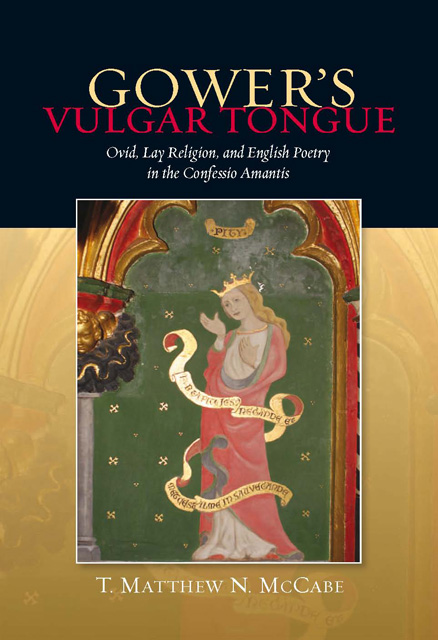Book contents
- Frontmatter
- Contents
- Acknowledgments
- Note on Abbreviations and Editions
- Abbreviations
- Introduction: Vernacularity and Public Poetry
- 1 Gower’s Ovidian Voice in English
- 2 English Writing and Lay Theology
- 3 At the Limits of Clerical Discourse
- 4 Kinde Grace
- 5 Ethics, Art, and Grace
- Conclusion: Gower and Public Poetry
- Bibliography
- Index
Introduction: Vernacularity and Public Poetry
Published online by Cambridge University Press: 14 February 2023
- Frontmatter
- Contents
- Acknowledgments
- Note on Abbreviations and Editions
- Abbreviations
- Introduction: Vernacularity and Public Poetry
- 1 Gower’s Ovidian Voice in English
- 2 English Writing and Lay Theology
- 3 At the Limits of Clerical Discourse
- 4 Kinde Grace
- 5 Ethics, Art, and Grace
- Conclusion: Gower and Public Poetry
- Bibliography
- Index
Summary
Forthi good is that we also
In oure tyme among ous hiere
Do wryte of newe som matiere …
He hath this charge upon me leyde, …
That to his hihe worthinesse
Som newe thing I scholde booke …
I thenke for to touche also
The world which neweth every dai …
Forthi the stile of my writings
Fro this day forth I thenke change
And speke of thing is noght so strange …
And that is love.
To consider English vernacularity as such is no “newe thing” in Middle English literary studies. Some might say this train has not only left the station but also finished its journey and been reassigned a branch line. But even when the construct “English vernacularity” was in its heyday—as before and since—scholars have for the most part shown a surprising disinclination to explore the rhetorical significance of English vernacularity for John Gower’s Confessio Amantis: very few studies give sustained attention to what Gower’s adoption of English language in this work meant for his role as a public poet and advocate of reform. There are of course good reasons for this reticence. Because he wrote French, Latin, and English in roughly equal proportions, scholars who work on Gower have perhaps always been more favorably positioned than their non-Gowerian counterparts to recognize that various forms of multilingualism, not monolingualism, were normative among most fourteenth-century audiences of English literature, and thus to resist viewing Middle English through the lens of a reductive English/Latin binary. Indeed, if vernacularity stands for the diversification of textual cultures that occurs when writers intentionally accommodate their modes of writing to enhance accessibility for new kinds of readers, as I use it to mean here, the term applies extremely well to Gower’s Latin Vox Clamantis, as well as to his works in French and English. But the Confessio is an English poem, whose author manifestly regarded his adoption of this language as a new departure (cf. Prol. 23; VIII.3108). There can be no doubt but that English vernacular poetry was an extraordinarily dynamic medium in the 1380s. Accordingly, just as it is a mistake to assume that the English vernacular belongs always to “the people” and thus to the march towards liberal democracy, so it is a mistake to resist asking the question: What was at stake when a London-area intellectual, who was certainly prosperous, probably a lawyer, had taken up English as the primary language of a major work of public poetry by 1385?
- Type
- Chapter
- Information
- Gower's Vulgar TongueOvid, Lay Religion, and English Poetry in the <i>Confessio Amantis</i>, pp. 1 - 10Publisher: Boydell & BrewerPrint publication year: 2011

